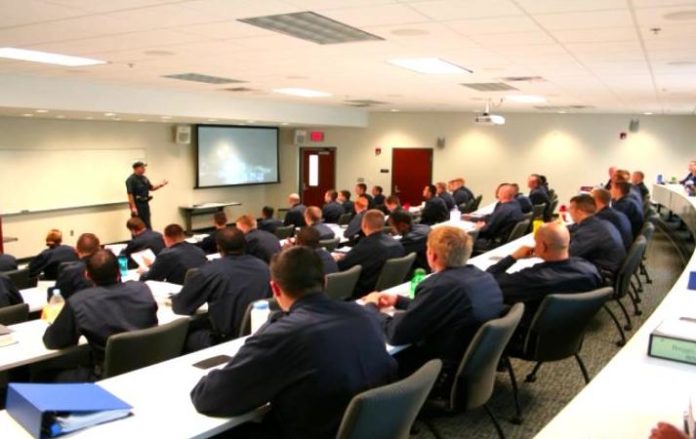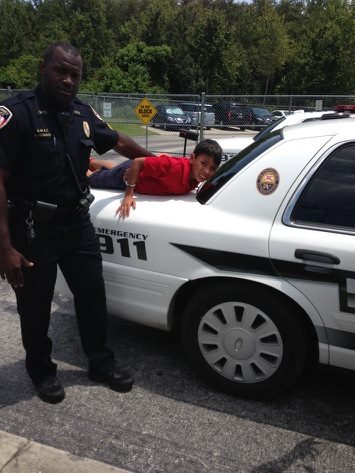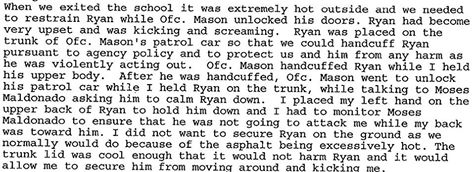
This past August, a ten year old Kissimmee, Florida autistic boy was handcuffed and laid across the trunk of a scorching hot cruiser. Police responded to the Cypress Elementary School for what is commonly known as a Baker Act. A Baker Act is simply when police take someone into custody who is a danger to themselves or others due to a mental illness. This is a prevalent topic in law enforcement training as it is vital to know the difference between criminality and mental illness, a distinction that many officers on the road fail to recognize.
In this case, officers were dispatched by the school principal, to take control of an autistic child named Ryan Maldonado. One obvious problem in our school system is that many education professionals don’t have the training and experience truly required to deal with special needs students in a crisis. Ryan had become frustrated and threatened to harm himself with a pair of scissors. This prompted the principal to bypass contacting Ryan’s parents and contact police instead. Although Ryan’s father arrived before police, he was not allowed to see him and was warned that he would be potentially interfering with an investigation and risked arrest.
A statement provided to the Free Thought Project by Ryan’s mother stated “He had difficulty being redirected which resulted in a really bad meltdown. My son made threats to harm himself with scissors which were accessible to him from the teacher’s desk. The principal did not call us, but did call law enforcement to have him Baker Acted. The teacher did call my husband and he arrived at the school within minutes and 10 minutes before law enforcement. Upon his arrival he was told that he could not see Ryan because he would be interfering with an investigation and would risk being arrested. When three law enforcement officers arrived to the classroom, Ryan was still very upset. They proceeded to drag him down the hall, passed by my husband who was very upset and placed him on the trunk of the police car on one of the hottest days of the week (100 degrees if not higher – police officer states this in his report ) and handcuffed him in front of the school and held him down on the hot car for several minutes before communicating to my husband that they planned to baker act him.”


As an officer, one will come across many situations that appear to be one thing but turn out to be something else. Do you think the average officer knows the difference between a DUI driver and a diabetic in a state of hypoglycemic shock? Probably not. How about a resistant combative subject and a ten year old autistic boy? Again, the focus on this situation goes back to training. Officers must have the ability to recognize signs of mental illness and act accordingly. With police, however, since their only tool is a hammer, everything looks like a nail. Sometimes cops just want to get to the next call and wrap up a delicate situation the fastest way they know how. Force. The obvious choice here would have been to de-escalate the situation, bring in Ryan’s father and quell the situation in a manner good for everybody.
The specific factors to look for in this case are the experience and training levels of the officer. In many parts of the country, Critical Incident Training is offered to police departments under state and federal grants typically available to all agencies. CIT training addresses many of the common incidents law enforcement will encounter, primarily focusing on mental health. Dealing with mental health issues is a necessity in law enforcement. It is also one of those areas that is not criminal in nature, yet only law enforcement is properly equipped to handle. The biggest obstacles to getting officers trained in this area are budgets and staffing, but that topic deserves an article of its own.
As usual, the police backed the actions of the officers instead of highlighting the other better alternatives. Half of police work is learning to articulate your actions regardless of circumstance and justification. Ryan’s parents are planning legal action against the school claiming that their parental rights were violated.





I have a grandson that has the same problem. His mom had to hide all the knives, scissors or any other thing he could have used as a weapon to harm himself or others. Schools know when children have problems and what those problems are. It is very possible that the dad could have made matters worse as my grandson would do when he was expected to calm down it sometimes got worse before it got better. I do believe law enforcement should have more training for mental illness and medical problems. If that was my grandson or child unless he was actually carelessly injured I would not have a beef with how the situation was handled. Unless you personally experience a child with the same problem you don’t really have a clue what they can be like!
Perhaps the only solution is to have mental health professionals accompany law enforcement everywhere, as the patrol partner — and have the ability to trump a cop’s heavy-handedness as needed.
That principal also needs training. Unless there’s a hostage situation, or a student with an actual weapon, law enforcement has no place on a campus.